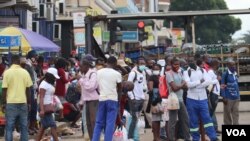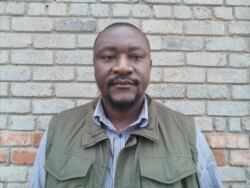President Emmerson Mnangagwa has relaxed Zimbabwe's coronavirus lockdown, saying new infections continue to decrease. Vendors welcome the move but say they need help buying protective equipment so they can safely operate. Meanwhile, the main opposition party says more needs to be done to help the country bounce back from the pandemic.
In a nationally televised address late Monday, President Emmerson Mnangagwa said Zimbabwe was with immediate effect relaxing most lockdown regulations – which the country reimposed early January following a spike in cases.
“It is noteworthy that the number of COVID-19 positive cases, fatalities and hospitalizations continue to steadily decrease. We must, however, remain alert and on guard to maintain this positive momentum attained so far. The government has rolled out the first phase of the national COVID-19 vaccination program which targets the front-line workers, security sector, and members of the media, the elderly and those with underlying conditions. More vaccines are coming and people will have the opportunity to be vaccinated,” said the president.
The country started a vaccination drive last month after receiving 200,000 doses of the Sinopharm coronavirus vaccine donated by Chinese government.
Samuel Wadzai leads the activist group Vendors Initiative Social and Economic Transformation in Zimbabwe. He welcomed the government’s decision to allow informal traders to resume operating.
“This is going to significantly help us to survive. The lockdown itself was causing a lot of suffering. The informal sector was heavily affected,” he said.
But Wadzi wants the government to help vendors obtain personal protective equipment to avoid a new surge in cases.
“The majority of informal traders are unable to buy those PPEs given that they have been out of business a long time. We really need to go back to work and cover for the lost revenue during the lockdown,” he said.
Fadzayi Mahere is the spokeswoman for the country’s main opposition party, the Movement for Democratic Change Alliance, and has just recovered from COVID-19, the illness caused by the coronavirus. She said the government has been using lockdowns to restrict freedoms.
She also said Zimbabwe needs a plan to bounce back from the pandemic.
“There is no post-COVID economic revival plan. There is no post-COVID social support plan. Both big and small businesses are facing closure and there is no policy plan to ease the pressure. The question of social safety nets remains wholly unanswered. We have ordinary people in rural areas, townships and vendors, more vulnerable than ever. Nothing has been done to address their plight,” said Mahere.
The government has offered small monthly grants to ease people’s suffering, but the money is not enough to buy a dozen loaves of bread.
Zimbabwe currently has about 36,000 confirmed infections and close to 1,470 deaths, according to the Johns Hopkins University, which is tracking the global outbreak.






